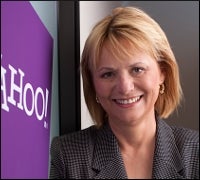 |
| Carol Bartz Source: Yahoo |
A defiant Carol Bartz took the stage at Yahoo’s analyst day this morning, promising the audience that she would reinvigorate the flagging Web pioneer, and making no excuses for the company’s past missteps.
“Today is the beginning of a journey back to respect,” said Bartz, who took the company’s top job in January. “Yahoo was the big shining star in the mid-90s, the big shining star in the mid-2000s. Then somehow we weren’t so shiny anymore.”
She only spoke briefly, setting the tone for the various presentations throughout the day from company executives, engineers and product managers in what is aimed as a show of force to remind the financial community that Yahoo (NASDAQ: YHOO) still matters, and that the firm is moving to execute on a clear strategy that Bartz and her team have put in place.
“We’re not here to wow you,” Bartz said. “We’re here to impress you.”
In her early months at Yahoo, she as a corporate identity crisis, where analysts and even employees were unsure what, in fact, Yahoo was supposed to be about.
The identity Bartz is trying to forge turns on scale. By its own tally, Yahoo reaches 600 million people worldwide each month, including more than 75 percent of U.S. Internet users.
The result is 10 billion ad impressions served up each day, of which 9 billion come from Yahoo’s Right Media Exchange.
Still grappling with the identity of the company, Bartz earlier this year deployed teams in about 10 countries to canvas users about what Yahoo meant to them. The response, she said, was the emphatic expression of the Yahoo faithful that it is their home page for the Web.
Of course, they venture out to other sites, but return to Yahoo to “check in,” she said.
“They come home,” Bartz said. “They come home to Yahoo. That is scale that nobody else has. That’s diversity that nobody else has. That’s really important.”
The way she views it, Yahoo’s scale and myriad content offerings defy the temptation to make an apples-to-apples comparison of the company to any other.
Running through Yahoo’s verticals, Bartz sees Yahoo competing with ESPN in sports, with the BBC and CNN in news, Bloomberg and the Wall Street Journal in finance, with TMZ in celebrity gossip, and, as a portal-style home page, with AOL and MSN.
“Guess what, they’re all our competitors. And guess what, we wake up with passion every morning to beat every one of them,” Bartz said. “And guess what, we usually do.”
As to Yahoo’s identity, Bartz resolves it this way:
“We’re not a search company. We’re not a display company. We are a broad-based Internet technology company that serves up the most interesting content on the Internet.”
For advertisers “looking for a safe neighborhood,” Bartz believes that Yahoo remains a must-buy. The company’s success going forward — including raising Yahoo’s 6 percent operating margin, which Bartz called “pathetic” — turns on Yahoo’s ability to continue to build out its content and provide a more personally relevant experience for its users.
The drive to personalization has been evident in several of Yahoo’s recent initiatives, including its redesigned home page, and tweaks to some of its most popular products like search and e-mail. Those upgrades, the thinking goes, will increase user engagement and expand Yahoo’s reach, while at the same time gleaning insights about its audience that can be used to serve better-targeted ads.
Such was Bartz’s pitch.
“We have fallen, and we really want to get back up. We want to get back up on our tippy-toes,” she said. “We have passion to get back there.”


